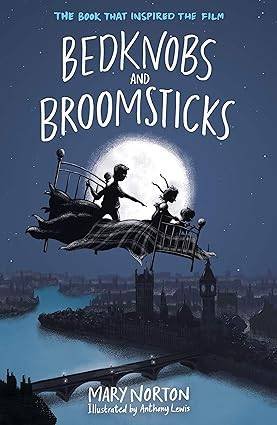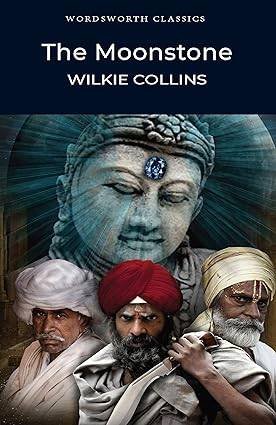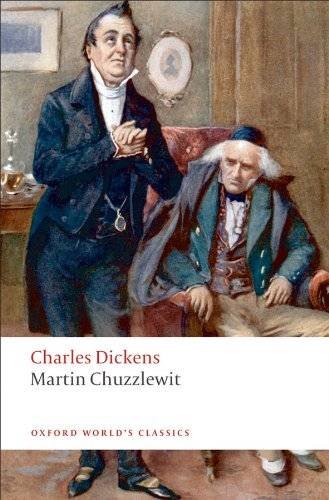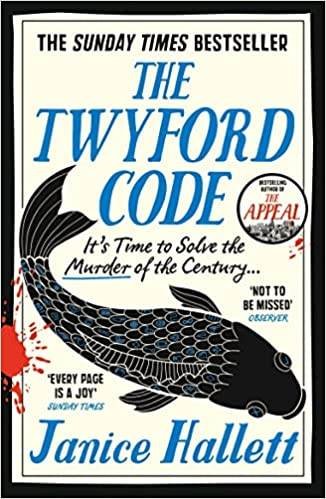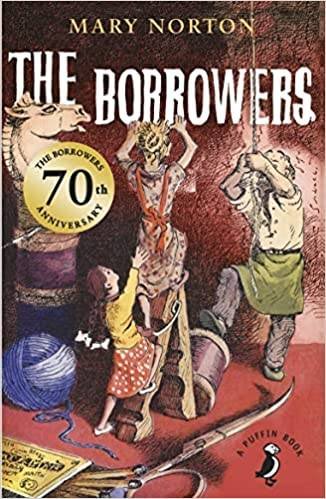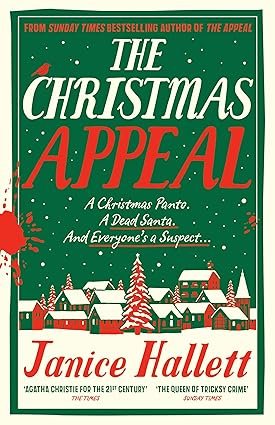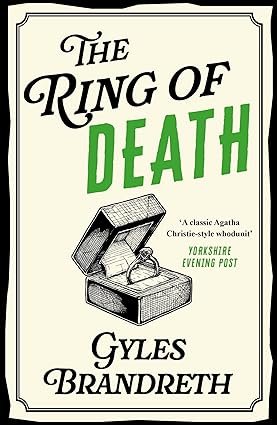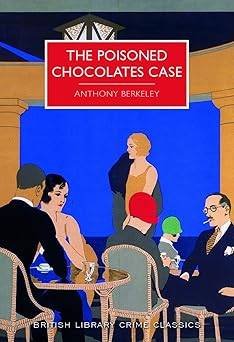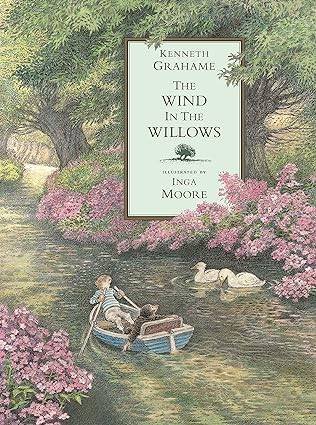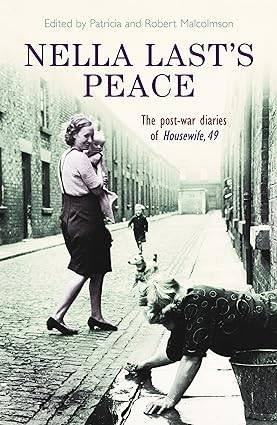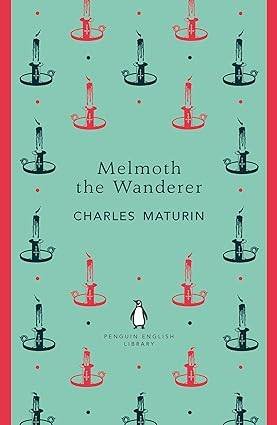Home » Book Reviews » Mary Norton » Bedknobs and Broomsticks by Mary Norton
Possible spoilers ahead
I loved Mary Norton’s The Borrowers book, so I have high hopes for this one too. It sounds wonderfully magical with a flying bed, very Enid Blyton-esque with her magical wishing chair books. I am looking forward to entering a wonderful world of magic and adventures. Grab your copy and let’s read it together!
Carey and Charles and Paul are staying with their elderly Aunt Beatrice in Bedfordshire for the summer. Early one morning, they find Miss Price, their very prim and lady-like neighbour, sitting on the ground in their garden with a twisted ankle, with a broom beside her. Paul immediately says he imagines that she has hurt her ankle by falling off the broom, stating that he regularly watches her flying on the broom at night, and he speaks encouragingly of how she has been improving at this. Miss Price is tearful that Paul knows her secret, and the older children are annoyed at Paul for not telling them of the secret. They help Miss Price home, and then visit her at her cottage the next day. They ask her if she is a witch, and she says she is studying to be one, which the children react enthusiastically to. She demonstrates her skills by briefly turning Paul into a little yellow frog, although he was unaware of this at the time as he felt nothing different. Miss Price then states that she will have to use magic to ensure that the children don’t share her secret, but in the end she decides to instead create something lovely for them which will then be taken away if they tell her secret. The only thing the children have in their pockets for Miss Price to use in a spell is the bedknob from Paul’s bed which he had naughtily unscrewed that morning, so Miss Price puts a spell on this so that when they half-screw it on the bedpost, they can make a wish and travel away to wherever they want to go, but this is with the condition that if they speak a word about her secret then the spell is broken. Oooh, I love the ideas in the book so far and the gentle humour and charm, such as Miss Price regretting that she started too late in life training to be a witch which means that she is now unable to become a wicked witch! And also that she didn’t have the time to dedicate to her witch studies earlier in life due to piano lessons and looking after her mother, tee hee, I love the everyday elements brought into such a magical subject. I also love the three children with their frankness and curiosity and enthusiasm and encouragement at what Miss Price says, with declaring their surprise that she chose to sing at the church concert instead of demonstrating her magical skills, and their kindness in helping her when she injured herself by falling off the broom, and their ability to reason politely with her about the method chosen to ensure they don’t tell her secret. I also love how the author seems to speak directly to the reader, such as ‘Carey was about your age’, and ‘you all know somebody rather like Miss Price’. And I love that the story started with the immortal story-telling words of ‘Once upon a time’. I also like the descriptions of the scenes, ‘their shoes left black smudges in the pearly grass’, and ‘it seemed as if the world, except the birds, were still asleep’, and ‘the rising sun glimmered through the hedgerows’. I also like the practical descriptions added into such magical goings-on, such as ‘she would grip the broomstick with one hand and try to hold her hat on with the other’. I am also full of envy for the tea they have when they go to visit Miss Price, ‘scones, the bread and butter, the quince jelly, and the ginger cake’, and I’m bearing in mind that Miss Price wasn’t even expecting them to tea so this kind of food must just be her usual afternoon food, yummy! I was intrigued with Miss Price lending Paul ‘a large book full of pictures called Paradise Lost’, as I guess this is the John Milton book but reading up about it on Wikipedia I would have thought that was a bit of a heavy subject matter for children. And I just love the ingenuity of the bed now being able to take them places, not just the fact that they have a ready-made vehicle to transport them, but also that their travels must therefore happen at night when they are in bed therefore making it all the more wonderfully secret and magical. I can’t wait for their adventures to begin!
The children return to Miss Price’s cottage the following day saying that the bedknob didn’t work. She can’t understand this, and takes them to her work-room. She arranges three hazel twigs into a triangle and puts the bedknob inside the triangle, and then scribbles the spell on a piece of paper, rubbing bits out and altering them, and muttering ‘hellebore, henbane, aconite, glow-worm fire and firefly light’. She then declares that the spell does work, demonstrated by the bedknob glowing with light. She also adds that her alteration now means that the spell now allows them to go back into the past, as well as to go wherever they want to go, and that it can only be Paul himself that twists the bedknob to activate the spell. Tee hee, I did chuckle at the ingredients that Miss Price has in her work-room, with typewritten labels on each jar, and her notebooks recording each success and each failure, all so beautifully organised, and how proud she is of her stores. And again, I love the gentle humour of the story, with Miss Price mentioning her stash of poisoned dragon’s liver causing Paul to ask if she poisoned the dragon or poisoned the liver, and Miss Price also then admitting that it just came as part of the equipment. Also when Paul questions the purpose of the alligator hanging from the ceiling, and Miss Price admits that it isn’t useful for anything much but that she likes the look of it, tee hee. These are lovely touches demonstrating Miss Price’s excitement and pride and delight and her understandable wish to impress. Also when a foolish question is asked by Charles and Miss Price ‘looked at him as the bus conductor looks when you ask for a ticket to a place off the bus route’, tee hee. And I chuckled at her saying that if she shares the contents of the witch course, she will be fined £200 and made to suffer recurring attacks of Cosmic Creepus, how I’d love to know what that ailment involves! And I again love the little descriptions of nature, such as ‘butterflies balanced precariously on the spears of lavender and bumblebees hung in the foxglove bells’.
The children decide to go on an adventure with the bed that evening, the older ones suggesting ‘a South Sea island…the Rocky Mountains…the South Pole…the Pyramids…Tibet…the moon’. However, they let Paul decide and he requests they go to their own home in London to see their mother, or to the Natural History Museum as he had missed a visit there a while ago due to being unwell. They finally agree to visit their mother, after Paul gets upset when the older children try to convince him that he should be picking a destination more unusual and exciting and ‘absolutely extraordinary’. I love Norton’s accuracy with the nature of children, with Carey and Charles’ jealousy that the magic can only be activated by their much younger sibling, Paul, as well as their anxiousness that he doesn’t go off on the bed without them, and the understandable feeling of power that Paul gains from this. And I admire the choices of destinations that the older children come up with, and how knowledgeable they are, as well as the wistfulness and less ambitious wish of Paul to see his mother, bless him.
They arrive on the pavement outside their house in London, with the bed overlapping the kerb, and Charles is immediately aware of how conspicuous they look with a bed on the pavement. However, their mother isn’t at home and a policeman comes by and questions them, stating that the bed is causing an obstruction and is a danger to the public. The children aren’t able to answer his questions about how they got the heavy iron bed there, without lying which they are loath to do, and when Carey reluctantly admits truthfully that it got there by magic, he then accuses them of being cheeky and takes them to the police station. The bed is later brought by van to the yard there. They are treated kindly at the police station and looked after by Mrs Watkins, and manage to escape on the bed in the yard when they show interest in seeing the policeman’s little garden and the flowers he has grown and his canary. The next day they visit Miss Price to tell her about their adventure. In the course of their talk, Carey asks about spells to make money, as Miss Price has mentioned she only has ‘a little annuity left me by my dear mother’, but Miss Price explains that creating spells to make money is one of the hardest things due to the difficulty of getting the ingredients, and points out that there are never rich witches and that most ‘live in hovels’. Carey asks Miss Price to join them on their next adventure with the bed, and Miss Price is ‘flustered and pleased’ to accept the invitation, Carey also feeling that to have an adult with them might make it safer. Awww, I love these children and how they have been brought up not to tell lies, even though the truth is impossible to admit, and how this even leads to Carey questioning Miss Price about if it is entirely fair for her to enter the local flower show with a rose she has grown using magic. I also love the practicalities of the explanation of how money can’t easily be made using magic, I feel the author has very sensibly dealt with a tempting question that would naturally pop into the reader’s mind!
They decide to go to a South Sea island, Miss Price at first not being keen but Carey assures her she can ‘just sit in the sun and rest your ankle’ and that it would do her good and she could take her broomstick. They use an encyclopaedia to choose a suitable island and decide on Island Ueepe, which was spotted by a sailing ship in 1809 and is thought to be uninhabited. The children pack a bucket and spade and a butterfly net they plan to use for shrimping, and excitedly talk of eating bananas and bread-fruit and pineapples and mangoes and seeing a coral reef. They don’t dress in day-time clothes but just put dressing gowns over their pyjamas and still wear their slippers. Miss Price brings a book and an umbrella to shelter her from the sun as well as her father’s old sun-hat with mosquito netting around the rim, and bottles of ginger-pop and hard-boiled eggs and sandwiches. Oooh, I love the items that the children and Miss Price choose to take with them, these say so much about their personalities, and I love that even though they are on a magical adventure it doesn’t alter their personalities and tastes, plus these requirements are humorous to read! And I loved the food that Miss Price brings along!
When they arrive on the island, Carey and Charles go off to explore, ‘the sand was as smooth and fine and white as icing sugar’, and they swim in a pool ‘where the roots of trees writhed down into the clear water’, they see a huge turtle and crabs and unfamiliar birds, and split open a coconut to drink the milk, and eat bread-fruit. But when they head back to the bed, they are captured by three men who are cannibals and plan to eat them and who have also caught Miss Price and Paul, Miss Price being tied up and chosen to be put in the pot first. Oooh, it was suddenly quite scary when Carey and Charles saw the cannibals, ‘three figures stood there, silent…three dark figures, so still’, and when Carey runs from them and they chase and catch her and ‘she felt their breath on the back of her neck’, it’s all really quite sinister, especially coming so quickly after their peaceful swim in the idyllic pool, it’s such a stark contrast.
The large group of cannibals have formed a circle and are chanting and dancing and banging drums, and then their leader, the witch-doctor, makes his way into the middle of the circle holding Miss Price’s broomstick. He jumps in the air and howls, but Miss Price howls back at him in a challenging manner and then gives a piercing whistle, which shocks him. She then does some magic, raising herself a few feet off the air in her sitting position. The witch-doctor uses magic to bring the broomstick towards him, but Miss Price uses magic to bring it towards herself, and the broomstick moves between them, with the children silently cheering Miss Price on. Miss Price wins and the broomstick ends up in her lap, but the witch-doctor comes towards her with a spear, so at Paul’s prompting, she turns the witch-doctor into a yellow frog. Miss Price then quickly unties her bonds and calls to the children to jump on the broomstick, which struggles with the weight of all four of them so they all need to shout together the incantation of ‘Frog’s spawn, toad’s eye, newts swim, bats fly’, and they wobble and rise into the air as the cannibals come towards them with knives. They reach the bed, which is close to being submerged in the sea, and return home. However, the bed and bedding are drenched, as are they. Phew, that was all quite tense, I was cheering on Miss Price along with the children. And I love the incantation used to make the broomstick fly.
On their return, Miss Price sneaks out of the window just as the maid reaches the bedroom. The maid is shocked to see all the water and reports this to Aunt Beatrice who demands an explanation from the children. They tell her the truth about the South Sea island, though are careful not to mention Miss Price, but their aunt doesn’t believe them and tells them that they will be sent home that day, and adds that the maid has handed in her notice. The children take the chance to run round to Miss Price to tell her they are leaving and to say goodbye. They notice that Miss Price has put her prize rose, grown by magic, on the rubbish heap, and she explains that she intends to give up magic, which saddens the children. They are all tearful when they say goodbye, Miss Price telling them to ‘keep your warm hearts, your gentleness, and your courage’. On the train home, Paul tells the others that he still has the magical bedknob in his pocket. Sigh, I feel sad that the magic seems to have ended, though I still have half the book to go so I’m imagining and hoping that it’s not over yet. I love the words that Miss Price says to the children at parting, these are good words to try and live your life by, and I also like how this shows how attached she has grown to the children, without having intended to do so.
In fact, I’m wondering if this is actually two separate books, as the first part is called The Magic BedKnob and has a dedication ‘For Robin and Chick’, and this second part is called Bonfires and Broomsticks and also has a dedication, this time ‘For Pickle’. That would explain the feeling of an ending, which did seem a little strange mid-book. I’ve just looked on Wikipedia, and sure enough that is the case, the two books were combined into one volume. So the second part…
It is two years later. The children’s mother has put an advert in The Times seeking a home for the children for summer time as she has to work, and they can’t stay with their Aunt Beatrice again as she has since died. While the children are excitedly looking at the advert, wondering who will apply to take them, they spot an advert by a Miss Price asking for children to stay with her as paying guests, they recognise the address and realise it is the Miss Price they knew, and their mother agrees to them staying with Miss Price. They immediately try to remember where the magic bedknob is, and finally find it. Omg, how odd and alarming this seems now, to advertise for your children to stay with a stranger! And I wonder what work their mother does which is of ‘national importance’ as the advert says. And I did chuckle at all the logical and illogical places that the bedknob had been placed in over the last couple of years, such as in the knife box, the tool drawer, and in a tin at the back of the broom cupboard, just like any typical house.
The children arrive at Miss Price’s house, noticing that ‘the grass by the roadside smelt of clover, and high up in the sky a lark sang’, and ‘the scent of horse mingled with the scent of fields and deep country stillness spread away on all sides’. Miss Price explains to them, over a tea of scones and jelly and potted meat, that she had to earn some money by taking in boarders because she had put in a new kitchen sink. They ask to see her work-room, expecting to see the witch items she had there before, but the room now contains bottled fruits and vegetables, and she explains she has given up magic, to the children’s disappointment. But later Carey realises that Miss Price has Paul’s old bed from Aunt Beatrice’s house. However, when they look in their bags in their rooms in order to get the bedknob, they realise that the bedknob has gone and that Miss Price must have taken it when she unpacked their things. Eeek, the bed, Miss Price has the bed! But why has she taken the bedknob? Is it to ensure that no magic will happen, as she has stated to the children that she has given it up ‘for ever and ever’? But surely she can’t be that determined and stern, sigh. And I do love Mary Norton’s descriptions of nature, so heart-warming and poetic. And I love that there is ‘a delicious smell of hot scones’ as they enter Miss Price’s house, I remember Miss Price’s scones from the first story, yummy, and there is macaroni cheese for tea, I just love all the references to meals, again it reminds me of Enid Blyton’s books. And although the children are disappointed that Miss Price’s work-room contains bottled fruit and vegetables instead of her witch items, I was quite impressed at the array of things she had diligently bottled, it kind of makes me yearn to be that efficient and it harks back to a more self-sufficient time, I guess just after the war was a time when people commonly grew and foraged and bottled food, and it makes me sad that we’ve lost those habits, but perhaps I’m viewing it as cosy and nostalgic when probably at the time it was a sign of how hard things were, but surely even if times were hard it was still so wonderful to have the satisfaction of growing your own food and to know you had a supply of preserved food to see you and your family though the rest of the seasons. Anyway, while I’m obsessing about food (!), Miss Price has (to my absolute admiration and envy) jars of tomatoes, apple pulp, plums, greengages, elderberries, red currants, sliced pears, tarragon in vinegar, green tomato chutney, loganberries, rose-hip cordial, and mushroom ketchup, oooh, I would love a larder like that of my own!
About a week later, early one morning, Carey sneaks quietly into Miss Price’s room to place Paul’s shoes by his bed, which she had meant to clean and place there the night before, as Paul is sleeping on the sofa in Miss Price’s room due to there not being a third bedroom in the house. But she notices that the bed and Miss Price and Paul have gone! Carey and Charles are very angry that Miss Price has acted behind their backs like this. They speak with a restrained but angry tone to Miss Price at breakfast, and take Paul away to the edge of the meadow to question him. They cannot continue feeling angry however, as their eagerness and excitement takes over. Paul says he and Miss Price have only been off in the bed once and it was just to see if it worked and that they only went to the next town, and he says that it was Miss Price’s suggestion to try it. Carey states that it’s only fair that she and Charles have a turn as well, and reminds the boys that the bed also has the ability to take them back into the past so she feels they should be allowed to try that, just once, and says she is determined to tell Miss Price so too. Oooh, of course, I’d forgotten that the bed will take them into the past, hmmm, I’m wondering if this will be the theme of this second book.
Carey and Charles tackle Miss Price about her travelling in the bed without them, and request to also be allowed to do so and to go into the past. Miss Price is very reticent, saying she has burnt all her spell books and worries that if something goes wrong then she couldn’t get them back to the present. They in turn try appealing to her conscience saying that it’s not fair, they also threaten her by saying there is now no incentive to them keeping the secret of her being a witch if they get no reward from this, they also flatter her saying how good a witch she was and that they don’t doubt her skills at all in getting them home again. She finally agrees, but states that their trip has to be somewhere educational. Hmm, I do share Miss Price’s concern about the risk of being stuck in the past unable to return! And wow, those kids are good negotiators!
They go back in time to 27th August 1666 to Cripplegate in London, and to the premises of a man called Emelius Jones. He is a lonely and nervous man, wishing he could get out of the business of necromancy, having inherited it from the previous owner when he died, but can’t get out of it as he has no money and is daunted by the thought of starting out on a new career after the time and expense of all his training. He was also told by the previous owner that there is no such thing as magic and it is all a lie for the customers, so maintaining this lie also causes him stress, and he is stressed because he could be executed for practising magic, so is constantly torn between the pressure of pretending to be a necromancer and the pressure of pretending he isn’t one, depending on who comes through the shop door. However, the children are lost in time, not sure when and where they are, so appeal to Emelius for help, but he is scared of them, thinking he has accidentally created the magic which has brought them there and he has no idea of how to undo it. He explains the date and location to them and they immediately remark that the Great Fire of London will start very close to Emelius’ premises in a week’s time. When Emelius relaxes a little and talks to the children of his life, they realise that his childhood home in the countryside, which is his aunt’s house, is in the same village as Miss Price’s house, in the village of Much Frensham in Bedfordshire, and there are still places there now that were there in his time, which prompts the children to then wish they could show him how the village looks now. They are also eager to show him the magic bed, and to eat the food they have brought with them, cheese sandwiches and a thermos of hot cocoa. Oh dear, I couldn’t help feeling a little alarmed at this chapter heading of ‘The Past’, meaning, eeek, that they have actually done it! And I did chuckle at Norton speaking to the reader and giving them time to look up the word ‘necromancer’, I do like it when she speaks to the reader. And I did duly look it up and Wikipedia tells me that it is ‘the practice of magic involving communication with the dead by summoning their spirits as apparitions or visions for the purpose of divination, imparting the means to foretell future events and discover hidden knowledge’. And it’s an amusing twist having someone who is supposed to practice magic firmly not believing in it, and then being faced with the product of magic. I also found it amusing how the children reassure Emelius and he shares his woes with them, like he is the child and they are the adults with the answers. I was also amused that they blurted out about the Great Fire of London due to happen in a week’s time and chat to him about the King and the Plague. And (of course, no surprise, given my seeming obsession with this!) I love the practicalities of the bag of food they have taken with them. It is altogether just so charming and such genius writing. And I did so very much hope that Much Frensham in Bedfordshire was a real place, but it doesn’t appear so, sigh.
Miss Price is at home worrying about the children, and going over in her mind the method they used to try and calculate the date they were aiming to go back to and worrying that it was quite a rough guess. The children arrive back safely but have brought Emelius back with them, Carey promising Miss Price that it is just for the day. Miss Price is annoyed at this, instantly recognising that this will mean a return journey to take him back again. Emelius is in awe of Miss Price with her magical skills in creating the magic bed, and she is flattered by his praise, although denies any great skill, saying she has to follow everything from a book rather than retaining it in her head, and that he has achieved great things by becoming a professional necromancer. He is impressed with the modern conveniences in the kitchen, and in turn impresses them with his knowledge of the uses of plants in the garden. They all note however his lack of cleanliness and table manners, comparative to their standards of that time. Miss Price agrees that he can stay, but tells the children that he must have a bath and haircut and his clothes be cleaned, though Emelius states these are unhealthy things to do. They give him Little Arthur’s History of England to read, as ‘it would be all news from chapter seven onwards’. Tee hee, I did love their attempts at calculating the bed’s time journey, with how many twists the bedknob would turn and what the bed would consider the earliest point in history. And eeek, they’ve brought Emelius back with them! And I chuckled at Miss Price’s alarm of having a man in the house, thinking of men like a foreign species, not being sure of ‘all their ways, what things they liked to eat, and what subjects they liked to talk about’. And I love the thought of giving him a history book to read as it would be like news to him, tee hee! Honestly, Norton has such wonderful ideas. And eeek, I see that Little Arthur’s History of England is an actual real book, I must get that to read.
They all walk to the site of Emelius’ aunt’s house but there is only rubble where the house once stood, however along the way they learn that many of the fields still have the same names in their time as in Emelius’ time, though Emelius is terrified of the cars that pass them. They find his aunt’s gravestone in the graveyard and realise that she died on the very day that the children visited Emelius. Over the next few days, Emelius and Miss Price regularly talk about magic and enjoy each other’s company. However, he is keen to go home to check on his property after the Great Fire of London, and to deal with his inheritance of his aunt’s estate, knowing she has now died. He is keen to show them his aunt’s house in his time, so suggests that they all visit him in a week after he has gone back and got things sorted, but Miss Price is reluctant at this, pointing out that this would mean another trip on the bed and that it is also foolish to create attachments with people who are now dead. They take Emelius back and leave again immediately, saying a swift goodbye and not looking around the area. Oh, I feel a bit sad for Emelius being dropped off so abruptly. I loved how many of the fields still had the same name and with the same little paths through the fields as in Emelius’ time, so that in nature there had been relatively little changes.
A few days later, Miss Price begins worrying about how Emelius is and whether his home was damaged in the fire and if he’s been affected by the riots afterwards, as detailed in the history books. She suggests quickly going back to check if he’s all right, but without speaking to him or disturbing him. The children readily agree. Miss Price states that they must go prepared this time, by trying to dress more appropriately for the time, she wearing a black cloak and the children wearing their long dressing gowns tied at the neck, and taking her father’s old sword as a weapon just in case. They go back and find that Emelius is in jail on suspicion of causing the Great Fire by magic, as the people had noted how he had left the city just before the fire and returned after it had passed. Miss Price learns that he had been thrown into water with his hands and feet tied, in order to determine if he was a human or a sorcerer, as if he drowned then this meant that he was a human and if he lived then this meant that he was a sorcerer and would therefore be burnt at the stake. They go to the cell where he is being held and Miss Price assures him that they will find a way to rescue him and he won’t be burnt at the stake, but that they need to find somewhere to store the bed as it is broad daylight and people will notice her standing on the bed-rail talking to him through the cell window. Hmmm, I found all the treatment of Emelius quite distressing to read, I’m quite surprised that Norton included it in a children’s book. Of course these things did really happen, but it is so shockingly violent. However, I did chuckle at Miss Price’s typically practical and matter-of-fact attitude, listing her complaints of the neighbourhood and how a storm is forecast but that ‘it was such nice weather when we left home’, and when Emelius speaks of how cruelly he has been treated she says ‘Well, never mind, don’t dwell on it’ and advises him to ‘Tidy yourself up a bit and you’ll feel better’, she speaks just as you expect a maidenly aunt to speak, it is beautifully done.
They store the bed in a disused barn, but Miss Price insists that the children stay with the bed while she goes to rescue Emelius, armed with her broomstick and the sword. After an hour, and as the storm worsens, the children decide to go and look for her. They notice the streets are empty, as everyone has gone to watch the burning. They reach the crowd and see Emelius tied to the stake, very despondent, and the children begin to get desperate as the stake is then lit and there is still no sign of Miss Price. The crowd then suddenly becomes fearful and begins to run away, shouting that there is a witch on a broomstick. The children can see the broomstick circling above, though they can’t see Miss Price within her swirling black cloak on the broomstick. Soldiers fire muskets at the broomstick as it approaches the stake, where the fire has taken hold. A sword emerges from the black cloak but struggles to get close enough to the bonds holding Emelius, and the children worry he will be accidentally hurt by the sword. One of the muskets then hits the broomstick and the sword falls to the floor, the broomstick also begins to fall but then struggles upwards and flies away slowly and hesitantly. It is fired at again and drops down into the street out of sight of the children, and lots of the crowd run towards it armed with clubs and knives. Carey sobs for Miss Price, but then notices that Charles has run across to the now undefended stake and used the sword to free Emelius. Charles then swiftly leads Emelius and Carey and Paul away, saying they can do nothing now for Miss Price and that she would want them to be sensible and keep themselves safe. They reach the shed, and Miss Price is sitting on the bed! She immediately scolds them for leaving the bed when she had expressly instructed them not to, saying how frightened she was when she returned to the bed ‘longing to put my feet up for five minutes’ and found them gone, but all Carey can do is sob and hug her. Miss Price explains that it wasn’t her on the broomstick, that she had done ‘intrasubstantiary-locomotion’ and bewitched the cloak to move on its own. Omg, immediately when the children suggested leaving the safe place with the bed where Miss Price had instructed them to stay and to go after Miss Price, my heart sank as I had images of them missing one another. And it sank even further at the mention again of the burning, I really struggled to imagine how on earth Miss Price could manage to rescue Emelius, and I don’t think I breathed at all during the attempted rescue of Emelius and the shooting down of the broomstick. Children’s books shouldn’t be this tense! But phew, Miss Price, and everyone else, is ok. Omg!! But I am puzzled slightly with her plan of rescuing Emelius. Was the sword also bewitched under ‘intrasubstantiary-locomotion’, along with the cloak, and was it supposed to be able to cut through Emelius’ cords? Where was Miss Price if she wasn’t on the broomstick, was she in the crowd and did she plan to pull Emelius off the stake when the crowd fled after the broomstick, as Charles ended up doing? But then, if so, surely she would have seen Charles do that and joined them to return to the bed together?
When they return to Miss Price’s cottage, Emelius rests for a few days as he is suffering from shock. The children note that Miss Price is unusually kind to them over the next week, and also that she is writing a lot of letters and making phone calls and has businessmen visiting her. She then tells them that she has decided to join Emelius in his time as he cannot stay in her time, and in his time they will have his aunt’s house and livestock and an orchard and Emelius has a little money put away. She says she has sold her house, though she is taking the bathroom fittings with her to the 1600s and some other things which she views as essential, and the proceeds from the sale of her house and furniture will go to the Red Cross. She explains that she and Emelius are both lonely people and will be better together. She says they are going that evening, as the children go home the following morning, and that Paul will stand on the floor and twist the bedknob while Miss Price and Emelius sit on the bed. Charles points out that this means that the bed can never come back. Their goodbye is emotional with tears and hugs. The children feel lost when they are gone and the house feels empty, so Carey suggests they go to the site of Emelius’ aunt’s house, saying that Miss Price may somehow know they are there and thinking of them. And when they are there, Carey distinctly hears Miss Price’s voice sharply telling her to ‘come at once out of those lettuces’. Oh, I am so sad that Miss Price has gone back to Emelius’ time, and I don’t see why it couldn’t have been that he stayed in her time. His time just seems so brutal and unjust and basic, whereas there are so many advantages in her time, such as hygiene and education, etc. They’ve already seen how Emelius was nearly killed due to the people’s ignorance and prejudice, so why would she want to go there? The point that she lists in favour of being in Emelius’ time, mainly that he has his aunt’s house, applies to her time too as she has her house. Why can’t he adapt to her time, which seems much better to my mind, rather than her adapting to his time? And never to be able to come back again, that really makes me feel fearful for her, whereas if he had stayed in her time then there’s a chance he could go back if he wanted to. Maybe Norton didn’t want to write any more of these books so felt she had to find a way to definitely end it, and I guess I don’t want the story to end really and this just seems so very final with the bed in the 1600s. It just feels a really sad note to end on, with no hope of anything more. However, I did chuckle at the essential things that Miss Price insisted on taking with her, such as the bathroom fittings, her silver cream jug, a hot water bottle, an egg beater, a stash of tea, packets of biscuits and Ryvita, tins of sardines, photographs, a bottle of lavender water, her favourite spoons and her best tea-cloth, her best straw hat, and her father’s sword, it just makes it all seem so real and human! I think I preferred the first book with their adventures travelling to different places, rather than the second book with its one adventure of travelling into the past and with its very definite end to all further adventures, and the first book felt a bit more lighthearted than the second one as well. But I’ve thoroughly enjoyed both these books and the wonderful imaginative storytelling in them.
I feel tempted to read both Little Arthur’s History of England, and Paradise Lost, as they were both mentioned in this book. And I’m tempted to re-read Enid Blyton’s The Adventures of the Wishing Chair, just to keep with the magical furniture theme! And I think a re-read of Norton’s The Borrowers would be lovely too. I’ve also been reminded (by Little Arthur’s History of England) that I have a Charles Dickens book sitting on my shelves waiting to be read, called A Child’s History of England, which I presume is similar to the Little Arthur book, so perhaps I’ll dig that out too. And I can’t resist baking some scones to eat while I read those books, after all this thinking of food!
